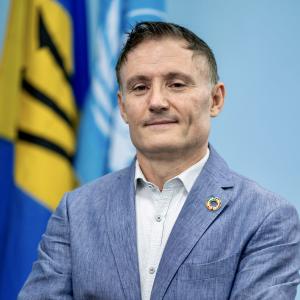- Honourable Eugene Hamilton, Ministry of Agriculture, Human Settlement, Cooperatives and Environment of SKN
- Government representatives from across the Caribbean
- Mark Barnett, President of the CWWA
- Dr. Arthur Eijs, Policy Advisor, Kingdom of the Netherlands
- Mr. Vincent Sweeney, Head, Caribbean Sub-Regional Office, United Nations Environment Programme (UNEP)
- Representatives of Waste Management Authorities
- Development Partners
- Ladies and gentlemen,
I was at the recent Climate Action Summit in New York, and the UN Secretary General Antonio Guterres began his address to world leaders with the acknowledgement that “Nature is angry. And we fool ourselves if we think we can fool nature. Because nature always strikes back. And around the world, nature is striking back with fury.”
I echo the words of the Secretary General today because the issues being discussed pertaining to waste are linked to the environmental and climatic vulnerabilities of the region.
The Caribbean region continues to pay the price of pollution due to high volumes of waste in these vast waters. The problem of marine waste was confirmed in the World Bank report, on Marine Pollution in the Caribbean, which indicated that an estimated 322,000 tons of plastic go uncollected each year across selected Caribbean countries.
Of these, 22 percent end up into the waterways. To complicate matters, the report also revealed that on average, about 85 percent of wastewater in the Wider Caribbean goes untreated into the ocean.
These figures are indeed worrying, especially for a region which depends heavily on tourism. So, the time to act on waste management is now and I commend the CWWA, the Govt of SKN, and other partners for prioritizing this issue by hosting today’s High-Level Forum.
Honourable Minister and government representatives, your momentum and efforts in the region to address and control plastic waste have not gone unnoticed. I applaud those who have launched nationwide bans against single use plastics and Styrofoam and encourage governments who are in the process of making that decision to join your counterparts.
Indeed, environmentalists have indicated that globally at least 80% of the plastic in the oceans come from land and that every second, at least 400 kg of plastic enters the marine system. We therefore congratulate you on your strong commitments which will benefit not only your tourism sectors, but will also result in waste management gains.
As part of our commitment to the SDGs, The UN embarked on an ambitious reform process which will result in a more coherent, less siloed UN Development System to advance the SDGs, along with deeper accountability to governments and the public.
This reform began in January 2019, and I share this today to highlight that the work of the UN towards waste management is and will continue to be a true partnership of the whole UN Development System.
The area Sustainable and Resilient Caribbean, along with Blue economy, have for example been prioritized by the UN in the region.
This is illustrated today through our active participation in this conference (especially UNEP today) and through partnering with the CWWA on a significant, multi-million-dollar regional project, within the framework of the Caribbean Waste Management Action Plan agreed upon last year.
Supported by the Global Environment Facility, UNEP has been working on the Integrating Water, Land & Ecosystems project and the Caribbean Regional Fund for Wastewater Management project.
In addition, other UN Agencies like the International Atomic Energy Agency, UNDP and FAO have been working on environmental issues pertaining to waste management of radioactive and nuclear sources, sustainable environmental practices in the fisheries sector, and the prevention and disposal of Obsolete Pesticides.
These are examples of how you can partner with One UN to leverage our collective value, expertise and resources for greater impact in tackling the waste challenges facing the region.
In closing, I wish to encourage you to address waste management as a whole Caribbean community. Small Island Developing States agreed at the Summit on the SAMOA Pathway held last month in New York, to address waste through innovative approaches. Mismanaged plastic waste, chemical waste and marine litter were prioritized.
However, to advance the SIDS agenda on this issue, investments in waste management infrastructure and recycling could have significant benefits if collective action at the regional level is taken. It can become a sustainable and impactful business model if regional economies of scale are pursued. Policy reforms would also be needed to reinforce regional governance and create an enabling environment.
Ladies and Gentlemen, the UN stands committed with you on this journey especially as you embark on the Caribbean Waste Management Action Plan. The time is right to do so, as we must prepare to take concrete actions to deliver on the Agenda 2030.
I wish you a very successful Forum.
Thank you!






